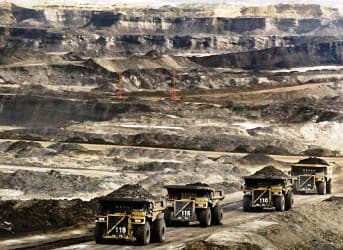ExxonMobil has announced the start of production at the Kearl oil sands project in Alberta, Canada, which holds up to 4.6 billion barrels of oil equivalent that the company intends to develop and market over the next four decades. Kearl is about 50 miles northeast of Fort McMurray.
Lifecycle carbon dioxide emissions are expected to be equivalent to those of many oil proceeds in the U.S. due to the absence of an on-site upgrader, also reducing the necessary capital investment and associated operating expenses. Production is expected to reach 110,000 barrels per day by the end of the year, to be doubled by the end of 2015 and trebled by the end of 2020. Yet even if operating costs fall, operating margins are threatening to fall as well in the Canadian oil sands patch.
These projections also depend upon the availability of the requisite pipelines. Bureaucratic objections to their construction have limited the industry's distribution to Canadian markets and access to global markets. The environmental protests against the Northern Gateway project in Canada and the Keystone XL project in the U.S. are only the most publicized. A new report by the major Canadian bank CIBC estimates a loss of $25 billion in revenues in 2012 due to limitations on the ability to bring the commodity to market. The lack of sufficient infrastructure is projected to continue to do damage in the amount of $15 billion per year until the problems are resolved. The Harper government has passed new legislation designed to streamline regulatory reviews and shorten the length of time that they consume, but its implementation is still in process and its effects remain to be seen.
At the same time, not just Ottawa but also Canada's First Nations (natives/aboriginals) have supported the construction of LNG facilities on the Pacific Coast of British Columbia. Even if Chinese domestic development of shale gas significantly advances, which is unclear given the geophysical situation of the deposits and technological difficulties in exploiting them, still all-Asian demand seems to justify the large number of planned projects. Both domestic and foreign investors in Canadian gas production look for important LNG exports from the country by the end of the decade.
There are projections of strong Asian demand over the long term, particularly for natural gas. Along with technical progress that has made shale gas recovery and marketing more commercially feasible, it is possible that Canadian investment in facilities for liquefied natural gas (LNG) for overseas export will increase. But Canada requires foreign investment to meet its targets overall. Last October in New Delhi, the government's energy minister Joe Oliver candidly stated that the industry will need over US$660 billion over the next decade to realize its full potential. Not even China will be able to come up with that, especially after the government has just revised its review procedures and criteria for major foreign investment in the wake of criticism of Beijing's takeover of Nexen.
By. Robert M. Cutler


















Even Keystone intially proposed the cheapest and dirtiest solution of going through sensitive areas in Nebraska. When the plan was rejected TransCanada said 'no problem, we can take another route' that was over a year ago and the reapplication is still winding its way through the process.
Harper has been a bully boy for the oil industry but his ham-fisted strategies are also self defeating; prepare for Justin Trudeau.
Pipeline construction requires a consensus; it will not be achieved by an industry that can't see beyond its own short term self interest.